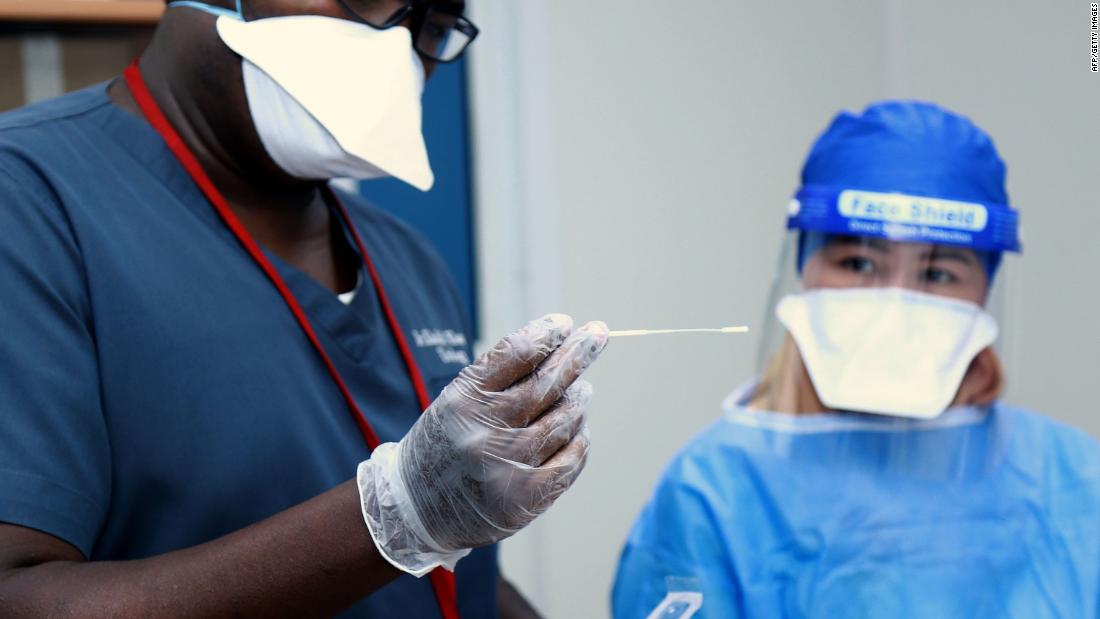Mexican in Austria tells what the measures are for covid-19 2:46
(CNN) -
When people are reinfected with COVID-19, their chances of ending up in hospital or dying are 90% lower than an initial COVID-19 infection, according to a new study.
The study published Wednesday in the New England Journal of Medicine found that there were few confirmed reinfections among 353,326 people who contracted COVID-19 in Qatar, and reinfections were rare and generally mild.
The first wave of infections in Qatar occurred between March and June 2020. In the end, around 40% of the population had detectable antibodies against COVID-19.
Then the country had two more waves from January to May 2021. This was before the most infectious delta variant.
To determine how many people were reinfected, scientists at Weill Cornell Medicine-Qatar compared records of people with PCR-confirmed infections between February 2020 and April 2021. They excluded 87,547 people who received the vaccine.
The researchers found that among the remaining cases there were 1,304 reinfections.
The median time between first illness and reinfection was approximately 9 months.
What the World Can Learn from Israel's Covid-19 Booster Vaccination Deployment
Among those with reinfections, there were only four cases severe enough that they had to go to the hospital.
There were no cases in which people were sick enough to need intensive care unit treatment.
Among the initial cases, 28 were considered critical.
There were no deaths among the reinfected group, while there were seven deaths in the initial infections.
advertising
"When there are only 1,300 reinfections among that many people and four cases of severe disease, that's pretty remarkable," said John Alcorn, an immunology expert and professor of pediatrics at the University of Pittsburgh who was not affiliated with the study.
The study has limits.
It was made in Qatar, so it is unclear if the virus would behave the same way anywhere else.
The work was done when the alpha and beta variants were the cause of many reinfections.
There were 621 cases where it was not determined and 213 from a "wild type" virus.
The delta variant, which is now the predominant strain, was not mentioned.
That could have an impact on the number of reinfections.
The rise of covid-19 threatens Europe's economic recovery
Previous studies have shown that natural immunity reduces the risk of infection.
A study conducted in Denmark and published in March found that the majority of people who had COVID-19 appeared to have protection against reinfection that remained stable for more than six months.
But a demographic check of who was getting infected again showed that they were mostly people 65 and older.
That study does not clarify how long protection lasts, nor does the new Qatar study.
Alcorn's own research on natural immunity shows that antibody levels also vary significantly from person to person.
Scientists don't yet know what level of antibody is protective.
But in some cases, the levels after infection may not be enough to prevent someone from getting sick again.
"It is necessary to determine whether this protection against severe disease at the time of reinfection lasts longer, analogous to the immunity that develops against other seasonal coronaviruses of the 'common cold'. They elicit short-term immunity against mild but to longer-term immunity against more serious diseases with reinfection, "the study noted.
"If this were the case for SARS-CoV-2, the virus (or at least the variants studied to date) could adopt a more benign pattern of infection when it becomes endemic."
Not getting the wrong impression about reinfection and vaccines
Dr. Kami Kim, an infectious disease specialist who is not affiliated with this study, said that people should be careful not to get the wrong impression that it means that people do not need to be vaccinated if they have been ill with COVID-19. .
"It's like asking if you need airbags and seat belts," said Kim, director of the Division of Infectious Diseases and International Medicine at the University of South Florida.
"The fact that you have airbags does not mean that seat belts will not help you and vice versa. It is good to have the protection of both."
Kim said the disease is not worth risking, particularly since an infection could have long-term effects.
"The incidence of long-term covid is much greater than the risk of receiving a vaccine," Kim said.
Furthermore, vaccines not only protect a person from getting sick, they also protect the community.
"Modern medicine is so much better, and people get cancer and already survive autoimmune diseases and thrive. Unless you are very close, you don't always know who is vulnerable to more serious diseases. And you could literally be putting people out. that you care at risk if you get sick and expose them, "said Kim.
"Without vaccination you cannot return to a normal life."
Vaccines to limit the possibility of variants
Is the Covid-19 Vaccine Safe for Children?
1:29
Limiting the number of diseases also limits the possibility of more variants developing, variants that could be even more dangerous than those in circulation now.
Alcorn said there is another important lesson from this study.
Fully vaccinated family members can celebrate the holidays without wearing masks, says Fauci
"Vaccines are still our best method of getting to the same place where these people who have been infected are," Alcorn said.
"The main conclusion of this study here is that there is hope that through vaccination and recovery from infection we will get to the level where everyone has some level of protection."
Covid-19




